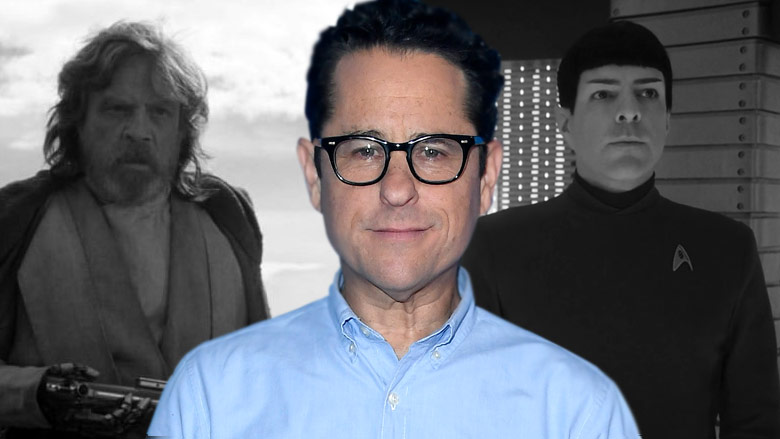
Getty / Screenshots from Disney and Paramount Measuring the impact of J.J. Abrams on ‘Wars’ and ‘Trek.’
It seems like everything has a rival — that equally powerful force created by fate to stand in the way of ultimate and unchallenged glory. In Ancient Greece, it was Athens against Sparta. Alexander Hamilton struggled against Aaron Burr. Even Coca-Cola looks over its shoulder to see Pepsi nipping at its heels.
There might be one friendly rivalry in popular culture that stands above all others — Star Trek versus Star Wars. Many fans see them as entirely different kinds of stories, which are only compared because they both occur in space.
This might be true. And the fact that Trek is (supposed to be) science-based fiction, while Wars is more space fantasy. Heck, even the Marvel Comics adaptations of the stories title it as a “space fantasy.”
Which is Better — Trek or Wars?
Many people have tried to size up which franchise is superior. Some cite that Wars films have grossed many times more than Trek films have. Others point out that Trek has dominated television, with over 800 episodes aired (with more to come), while Wars has fewer.
Star Wars, now owned by Disney, is a cash cow for the company. The Motley Fool reports that Disney made somewhere between $3 and $5 billion in merchandise after releasing “The Force Awakens” back in 2015. Star Trek has a checkered relationship with merchandising, as the Netflix series “The Toys That Made Us” laid out in a 2018 episode.
J.J. Abrams Directs Two Trek and Wars Films
Unfortunately, there were not many ways to compare these two huge franchises, even though fans have been trying. But, in 2009, J.J. Abrams’ produced “Star Trek” film was released, starring Chris Pine as Kirk. His production company, Bad Robot, would release two more Trek films — “Into Darkness” and “Beyond.” Abrams directed the first two of the three ‘Kelvin’ Trek films, leaving “Beyond” for director Justin Lin.
He could not direct “Beyond” because he was too busy making a new series of “Star Wars” films. Of these new films, he directed “The Force Awakens” and “Rise of the Skywalker.” He didn’t handle the middle episode, “The Last Jedi.” Instead, that was Rian Johnson. Abrams was involved with this middle chapter, though he did not produce or direct it. Disney brought Abrams back for “Rise” when they parted ways with director Colin Trevorrow.
So, thanks to J.J. Abrams’s involvement in Trek and Wars, fans can finally compare the two franchises based on these series.
Star Trek outranks Star Wars
Thanks to the ratings provided by Rotten Tomatoes, which aggregates the reviews by hundreds of film critics, fans can compare grades for movies. Their “Tomatometer“ system is often used as a trusted source in the media. Vox film reviewer Alissa Wilkinson writes that the Rotten Tomatoes’ “critical score is more controlled and methodical“ compared to the audience rating.
According to the Tomatometer scores, the three recent Abrams’ Star Trek films rank higher than the Star Wars sequel trilogy, which Abrams was also involved with. Here are the scores:
Star Trek (2009) – 94 rating
Star Trek Into Darkness (2013) – 84 rating
Star Trek Beyond (2016) – 86 rating
Star Wars: The Force Awakens (2015) – 93 rating
Star Wars: The Last Jedi (2017) – 90 rating
Star Wars: Rise of the Skywalker (2019) – 51 rating
Star Trek’s average rating is 88, while Star Wars’ rating is 77, primarily due to the negative critical reaction to “Rise of the Skywalker.” Even Captain Kirk didn’t like that movie:
Some fans will say that Abrams hurt Star Wars, while others felt that he’s ruined Star Trek. Either way, he’s helped create six new episodes for both franchises. It just appears that, according to the numbers, what he made for “Star Trek” was better.
READ NEXT: We Now Know the Release Date of the Next ‘Star Trek’ Film
